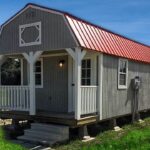Understanding the financial implications of choosing between modular and manufactured homes can save you thousands. Explore the critical differences in costs, features, and long-term value to make an informed decision.
Understanding Modular Homes
Modular homes are built in sections or modules in a factory setting. These sections are then transported to the building site and assembled. This method of construction offers a range of benefits that can affect overall costs.
One of the primary advantages of modular homes is the speed of construction. Since they are built in a controlled environment, weather delays are minimized, leading to quicker completion times.
Additionally, modular homes often have lower labor costs compared to traditional site-built homes. The efficiency of factory production allows for streamlined processes that can reduce expenses.
Customization is another significant factor. Modular homes can be tailored to fit individual preferences, which can influence the final price. Buyers can choose layouts, finishes, and additional features that suit their needs.
Exploring Manufactured Homes

Manufactured homes, often referred to as mobile homes, are built entirely in a factory and then transported to the site. Unlike modular homes, they are constructed on a permanent chassis, making them easier to relocate.
The cost of manufactured homes is typically lower than that of modular homes. This affordability is one of the main reasons they are popular among first-time homebuyers and those on a budget.
However, manufactured homes may come with limitations in terms of customization. Many models offer standard features, which can restrict buyers looking for unique designs.
Financing options for manufactured homes can also differ. Some lenders may have stricter requirements, which can affect the overall cost of ownership over time.
Cost Comparisons: Modular vs Manufactured
When comparing costs, it’s essential to consider various factors, including purchase price, installation, and long-term value. Modular homes generally have a higher upfront cost due to their construction quality and customization options.
On the other hand, manufactured homes offer a lower initial investment but may incur higher costs in terms of maintenance and depreciation. Understanding these differences can help potential buyers make informed decisions.
Insurance costs can also vary significantly between the two types of homes. Modular homes, being classified as real estate, often have lower insurance premiums compared to manufactured homes, which may be classified as personal property.
Property taxes are another consideration. Modular homes are typically assessed as real estate, while manufactured homes may be taxed differently, impacting overall ownership costs.
Long-term Value and Resale Potential
Long-term value is a crucial aspect when deciding between modular and manufactured homes. Modular homes tend to appreciate in value more steadily than manufactured homes, making them a better investment for many buyers.
Resale potential is also an important factor. Modular homes often attract a wider range of buyers due to their quality and customization options, leading to better resale values.
In contrast, manufactured homes may depreciate more quickly, particularly if they are located in areas where land values are stagnant. This can affect the return on investment for homeowners looking to sell in the future.
Understanding the market trends in your area can provide valuable insights into the long-term value of both types of homes. Researching local sales data can help buyers gauge the potential appreciation of their investment.
- Research local zoning laws and regulations.
- Obtain quotes for transportation and installation costs.
- Evaluate the quality of materials used in construction.
- Consider long-term maintenance costs and potential repairs.
- Explore financing options and lender requirements.
- Assess the resale potential based on local market trends.
- Investigate insurance costs and coverage options.
Frequently Asked Questions (FAQ)
What are the main cost differences between modular and manufactured homes?
Modular homes typically cost more than manufactured homes due to their construction quality and customization options. Modular homes are built to local building codes and can include higher-end materials, while manufactured homes are often more affordable but may have limitations in design and durability.
Are modular homes more expensive to insure than manufactured homes?
Yes, modular homes are generally more expensive to insure than manufactured homes. This is due to their higher value, construction standards, and potential for customization. Insurers may view modular homes as less risky, leading to higher premiums compared to manufactured homes, which may have lower resale values.
How do financing options differ for modular and manufactured homes?
Financing for modular homes is often easier to obtain, as they are considered real property. Traditional mortgages are available, similar to site-built homes. In contrast, manufactured homes may require personal loans or chattel loans, which can have higher interest rates and shorter terms, making financing less favorable.
Do modular homes appreciate in value like traditional homes?
Yes, modular homes can appreciate in value similarly to traditional homes, especially if they are well-built and located in desirable areas. Their value can increase over time, particularly if they are permanently affixed to land. In contrast, manufactured homes may depreciate more quickly due to their classification and construction type.
What are the installation costs for modular vs manufactured homes?
Installation costs for modular homes can be higher due to the need for a foundation and utility connections, which are typically included in the overall price. Manufactured homes usually have lower installation costs, as they can be placed on simpler foundations or even temporary setups, but may incur additional costs for site preparation.



















